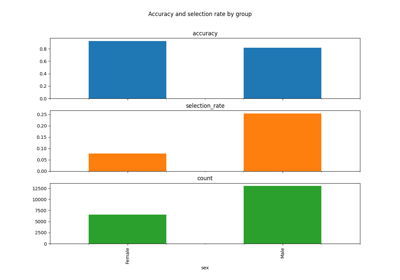fairlearn.reductions.GridSearch#
- class fairlearn.reductions.GridSearch(estimator, constraints, selection_rule='tradeoff_optimization', constraint_weight=0.5, grid_size=10, grid_limit=2.0, grid_offset=None, grid=None, sample_weight_name='sample_weight')[source]#
Estimator to perform a grid search given a blackbox estimator algorithm.
The approach used is taken from section 3.4 of Agarwal et al.[1].
Read more in the User Guide.
Added in version 0.3.0.
Changed in version 0.4.6: Enabled for more than two sensitive feature values
- Parameters:
- estimatorestimator
An estimator implementing methods
fit(X, y, sample_weight)andpredict(X), where X is the matrix of features, y is the vector of labels (binary classification) or continuous values (regression), and sample_weight is a vector of weights. In binary classification labels y and predictions returned bypredict(X)are either 0 or 1. In regression values y and predictions are continuous.- constraintsfairlearn.reductions.Moment
The disparity constraints expressed as moments
- selection_rulestr
Specifies the procedure for selecting the best model found by the grid search. At the present time, the only valid value is “tradeoff_optimization” which minimizes a weighted sum of the error rate and constraint violation.
- constraint_weightfloat
When the selection_rule is “tradeoff_optimization” this specifies the relative weight put on the constraint violation when selecting the best model. The weight placed on the error rate will be
1-constraint_weight- grid_sizeint
The number of Lagrange multipliers to generate in the grid
- grid_limitfloat
The largest Lagrange multiplier to generate. The grid will contain values distributed between
-grid_limitandgrid_limitby default- grid_offset
pandas.DataFrame Shifts the grid of Lagrangian multiplier by that value. It is ‘0’ by default
- grid
Instead of supplying a size and limit for the grid, users may specify the exact set of Lagrange multipliers they desire using this argument.
- sample_weight_namestr
Name of the argument to estimator.fit() which supplies the sample weights (defaults to sample_weight)
Added in version 0.5.0.
- fit(X, y, **kwargs)[source]#
Run the grid search.
This will result in multiple copies of the estimator being made, and the
fit(X)method of each one called.- Parameters:
- X
numpy.ndarray,pandas.DataFrame The feature matrix.
- y
numpy.ndarray,pandas.DataFrame,pandas.Series, list The label vector.
- sensitive_features
numpy.ndarray,pandas.DataFrame,pandas.Series, list A (currently) required keyword argument listing the feature used by the constraints object.
- X
- get_metadata_routing()[source]#
Get metadata routing of this object.
Please check User Guide on how the routing mechanism works.
- Returns:
- routingMetadataRequest
A
MetadataRequestencapsulating routing information.
- get_params(deep=True)[source]#
Get parameters for this estimator.
- Parameters:
- deepbool, default=True
If True, will return the parameters for this estimator and contained subobjects that are estimators.
- Returns:
- paramsdict
Parameter names mapped to their values.
- predict(X)[source]#
Provide a prediction using the best model found by the grid search.
This dispatches X to the
predict(X)method of the selected estimator, and hence the return type is dependent on that method.- Parameters:
- X
numpy.ndarray,pandas.DataFrame Feature data.
- X
- predict_proba(X)[source]#
Return probability estimates from the best model found by the grid search.
The underlying estimator must support
predict_proba(X)for this to work. The return type is determined by this method.- Parameters:
- X
numpy.ndarray,pandas.DataFrame Feature data.
- X
- set_params(**params)[source]#
Set the parameters of this estimator.
The method works on simple estimators as well as on nested objects (such as
Pipeline). The latter have parameters of the form<component>__<parameter>so that it’s possible to update each component of a nested object.- Parameters:
- **paramsdict
Estimator parameters.
- Returns:
- selfestimator instance
Estimator instance.
